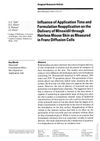
Search
for
Sort by
Research
360-390 / 1000+ results

research Investigational Medications in the Treatment of Alopecia
New treatments for hair loss are being developed using molecular biology.

research Liposomes And Niosomes As Potential Carriers For Dermal Delivery Of Minoxidil
Liposomes better deliver minoxidil for hair loss treatment than niosomes.

research Evaluation of Oral Minoxidil in the Treatment of Alopecia Areata
Oral minoxidil helps hair regrowth in 80% of alopecia patients, but only 18% see cosmetic improvement.

research Efficacy of 5% Topical Minoxidil Versus 5 Mg Oral Biotin Versus Topical Minoxidil and Oral Biotin on Hair Growth in Men: Randomized, Crossover, Clinical Trial
Using both minoxidil and biotin together increased hair growth more than using either one alone.
research Efficacy and Tolerability of a Topical Gel Containing Mimicking Growth Factors Oligopeptides, Caffeine, Taurine and an Iron-Chelating Complex in Subjects with Androgenetic Alopecia Treated with Topical Minoxidil or Oral Finasteride: A Prospective, 6-Month, Randomized, Assessor-Blinded, 4-Arm, Parallel Group Study
Adding the topical gel improved hair growth more than using minoxidil or finasteride alone.

research Human Hair Follicles Contain Two Forms of ATP-Sensitive Potassium Channels, Only One Sensitive to Minoxidil
One minoxidil-sensitive potassium channel exists in human hair follicles.

research Topically Applied Minoxidil in Baldness
Minoxidil helps hair growth, but results vary.
research Comparative Study Between Mesotherapy and Topical 5% Minoxidil by Dermoscopic Evaluation for Androgenic Alopecia in Males: A Randomized Controlled Trial
Mesotherapy is not significantly better than minoxidil for treating male hair loss.

research Pediatric Androgenetic Alopecia: A Review
Early diagnosis and treatment, like topical minoxidil, can prevent hair loss in children.

research Influence of Application Time and Formulation Reapplication on the Delivery of Minoxidil through Hairless Mouse Skin as Measured in Franz Diffusion Cells
Minoxidil absorption in skin is slowed by cleansing, depends on how long it stays on the skin, and is not much affected by reapplication.

research Androgenetic Alopecia: Causes, Treatments, and Genetic Factors
Heredity and hormones cause common hair loss, and topical minoxidil is the first recommended treatment.

research Topically Applied Minoxidil in Baldness
Minoxidil, when applied to the scalp, can stimulate hair growth but effects vary, stop if treatment ends, and it may cause side effects like fluid retention.

research Comparative Efficacy of Topical Finasteride (0.25%) in Combination With Minoxidil (5%) Against 5% Minoxidil or 0.25% Finasteride Alone in Male Androgenetic Alopecia: A Pilot, Randomized Open-Label Study
Using both minoxidil and finasteride together is more effective for male hair loss than using either one alone.

research Topical Solutions for Androgenetic Alopecia: Evaluating Efficacy and Safety
Topical treatments for hair loss can be effective but need careful safety evaluation.

research Topical Niacinamide Does Not Stimulate Hair Growth Based on the Existing Body of Evidence
Niacinamide does not promote hair growth.

research Comparison of Efficacy of Topical Betamethasone Dipropionate and Topical Minoxidil in Patients With Alopecia Areata
Betamethasone dipropionate lotion is more effective than minoxidil solution for treating Alopecia Areata.

research The Additive Effects of Minoxidil and Retinol on Human Hair Growth In Vitro
Minoxidil and retinol together help hair grow.

research Topical Dutasteride with Microneedling in Treatment of Male Androgenetic Alopecia
Combining topical dutasteride with microneedling is more effective for hair growth than microneedling alone.

research Histologic Response to Topically Applied Minoxidil in Male-Pattern Alopecia
Minoxidil can help grow hair and make hair follicles bigger, but it can also cause side effects.

research Very-Low-Dose Oral Minoxidil in Male Androgenetic Alopecia: A Study with Quantitative Trichoscopic Documentation
Low-dose oral minoxidil improved or stabilized hair loss in some patients, but higher doses may be needed for significant effects.

research Characterization of Follicular Minoxidil Sulfotransferase Activity in a Cohort of Pattern Hair Loss Patients from the Indian Subcontinent
About 41% of Indian hair loss patients have low enzyme activity that affects hair loss treatment effectiveness, with men affected more than women. Testing for this can guide treatment.

research Solid Lipid Nanoparticles Suspension Versus Commercial Solutions for Dermal Delivery of Minoxidil
SLN suspensions work as well as commercial solutions for minoxidil delivery, but are non-corrosive, making them a promising alternative.

research Guidelines for the Management of Androgenetic Alopecia (2010)
Use minoxidil for hair loss treatment, and finasteride for men.

research Formulation of Sodium Valproate Nanospanlastics as a Promising Approach for Drug Repurposing in the Treatment of Androgenic Alopecia
Sodium Valproate nanospanlastics could be a safe and effective treatment for Androgenic Alopecia, with fewer side effects than minoxidil.

research Status of Medical Treatment for Androgenetic Alopecia
Minoxidil effectively promotes hair regrowth in younger patients with small balding areas.

research Medical Management Options for Hair Loss
The document concluded that FDA-approved treatments like minoxidil and finasteride are effective for hair loss, while the effectiveness of natural remedies and other non-approved treatments is not well-supported by evidence.

research Hair Loss in Women: Comprehensive Overview and Treatment Options
Effective hair loss treatment in women requires correct diagnosis and can include medications like minoxidil, antiandrogens, and treatments for underlying conditions like PCOS.

research Alopecia Areata: Evidence-Based Treatments
Alopecia areata can cause unpredictable hair loss, and treatments like corticosteroids and minoxidil may help but have varying side effects.

research Hair Growth Therapies for Androgenetic Alopecia
Minoxidil, tretinoin, and finasteride may help hair regrowth in mild to moderate androgenetic alopecia.